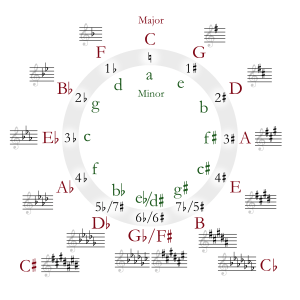E major facts for kids
 |
||
| Relative key | C♯minor | |
|---|---|---|
| Parallel key | E minor | |
| Notes in this scale | ||
| E, F♯, G♯, A, B, C♯, D♯, E | ||
- Also see: E minor, or E-flat major.
E major is a major scale that starts on the note E. Its key signature has four sharps. The relative minor key for E major is C-sharp minor.
Playing in E Major
E major can be a bit tricky for wind instruments to play. However, it works very well for the violin because two of its open strings (A and E) are important notes in the E major scale. Other orchestral string instruments also find it easy to play in this key. It's also a great key for the guitar.
When music is written in E major, clarinets that are tuned to A are often used instead of clarinets tuned to B-flat. This makes the music easier for the clarinet player. Clarinets are transposing instruments, which means the note they play sounds different from the note that is written on the music sheet.
E Major in Music
Symphonies written in E major are not very common. However, this key is often used for concertos. A famous example is Felix Mendelssohn's Violin Concerto.
Fun Fact
The famous bells of the Clock Tower in London, which houses Big Ben, are tuned to the key of E major.
| Diatonic Scales and Keys | |||||||||||||||||||||||||||||||||||||||||||||||||||||||
|---|---|---|---|---|---|---|---|---|---|---|---|---|---|---|---|---|---|---|---|---|---|---|---|---|---|---|---|---|---|---|---|---|---|---|---|---|---|---|---|---|---|---|---|---|---|---|---|---|---|---|---|---|---|---|---|
|
|||||||||||||||||||||||||||||||||||||||||||||||||||||||
| The table shows the number of sharps or flats in each scale. Minor scales are written in lower case. | |||||||||||||||||||||||||||||||||||||||||||||||||||||||
See also
 In Spanish: Mi mayor para niños
In Spanish: Mi mayor para niños
 | Anna J. Cooper |
 | Mary McLeod Bethune |
 | Lillie Mae Bradford |


